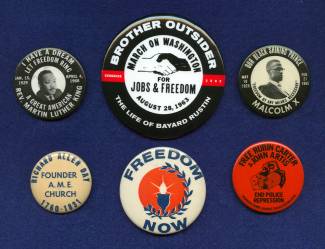Collection Name
About
Martin Luther King, Jr. was born in 1929 in Atlanta, Georgia. He was a graduate of Morehouse College, the Crozer Theological Seminary, and received his Doctorate from Boston University. In 1954 he became the pastor of the Dexter Avenue Baptist Church in Montgomery, Alabama. He soon became involved in civil rights leading a boycott of segregated city buses. King co-founded the Southern Christian Leadership Council in 1957. A believer in non-violent resistance, he organized numerous non-violent demonstrations, was arrested several times for civil disobedience, led the 1963 March on Washington, and was awarded the Nobel Prize for Peace in 1964. On April 4, 1968, Dr. Martin Luther King, Jr. was shot and killed while standing on the balcony of the Lorraine Motel in Memphis, Tennessee. His assassin, James Earl Ray, died in prison in 1998.
Born Malcolm Little in 1925 in Omaha, Nebraska, Malcolm X was first introduced to the Black Muslims while in prison. He became a Muslim Minister shortly after his release in 1952. He was later suspended from the Black Muslims and the Nation of Islam by its leader, Elijah Muhammad, after comments he had made following the 1963 assassination of President John F. Kennedy. Malcolm X founded his own organization, the Muslim Mosque and became a follower of Orthodox Islam. Malcolm X remained a black nationalist his entire life and in 1964 soon after returning from a trip to Africa formed the Organization of Afro-American Unity. He also came to drop the belief of separation of the races and felt that there could be a brotherhood among blacks and whites. Malcolm X was shot and killed on February 21, 1965 in New York City. His assassination remains controversial to this day.
The African Methodist Episcopal Church (AME Church) was founded by a former slave, Bishop Richard Allen (1760-1831) in Philadelphia, Pennsylvania in 1816. The AME church has its roots in a racial incident that occurred in Philadelphia's St. George's Methodist Episcopal Church.
Absalom Jones, a black man, was removed from the church while praying. Although members of the congregation, blacks were only allowed to pray at certain times and in a certain section of the church. Jones, Richard Allen, and others left St. George's and formed the Bethel AME Church in 1793 with Allen as Minister. Richard Allen went to court several times to successfully ensure his church's independence from the white Methodists. In 1816, he and other black Methodists throughout the adjoining states who had encountered racism in their churches met in Philadelphia to formally establish the African Methodist Episcopal Church. Richard Allen is the first black minister to have been ordained by Francis Asbury, the "Father of American Methodism". Absalom Jones became Episcopalian and would go on to become the first black priest in the Episcopal Church.
The "Freedom Now" button is from the early 1960s and from the Congress for Racial Equality(CORE), which had been founded in 1942. It was CORE which organized the Freedom Rides of 1961. Over 1000 Freedom Riders, both black and white volunteers, traveled throughout the South attempting to peacefully confront segregation and unequal accommodations.
Bayard Rustin (1912-1987) was a long-time civil rights activist whose early efforts go back to the late 1930s working on behalf of the Scottsboro Boys. He helped organize the first "Freedom Rides" (known then as the Journey of Reconciliation) in the South by CORE in 1947 to protest the Jim Crow laws. As a result he was arrested and for a period of time forced to work on a chain gang. Rustin was a believer in non-violence, helped Martin Luther King in organizing the Montgomery Bus Boycott and was the chief organizer of the 1963 Civil Rights March on Washington. Rustin was a homosexual. It is believed that for this reason he never received the credit he should have for not only his role in organizing the 1963 March on Washington, but his impact upon the Civil Rights movement in general. The "Brother Outsider" button displayed here is from a 2002 movie based on Rustin's life; the obstacles and struggles he faced and his passion for human rights, peace and racial equality.
Rubin "Hurricane" Carter (1937- ) was an up and coming middleweight boxer when he, along with John Artis, were arrested for murder in 1966. Several failed appeals followed. In 1985, a Federal Court judge ruled that Carter and Artis (who was already out on parole) had not received a fair trial and that the prosecution was "based on racism" and that evidence had been withheld. Carter and Artis had their convictions set aside. While in prison Carter had written an autobiography and had acquired much political and public support. Bob Dylan wrote the song, "Hurricane" about him, and in 1999 Denzel Washington starred in the movie, "The Hurricane".
Buttons from the collection of Albert and Angela Feldstein
Text from over forty years of notes, newspaper and magazine clippings, flyers, and other sources associated with the collecting of buttons and used in the research of the 2003 political history poster entitled, "Buttons of the Cause, 1960-2003: The Events, The People, The Organizations, The Issues".
